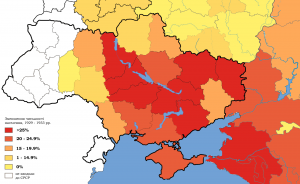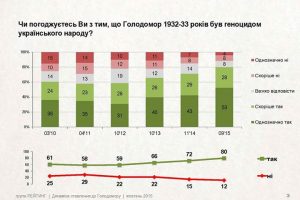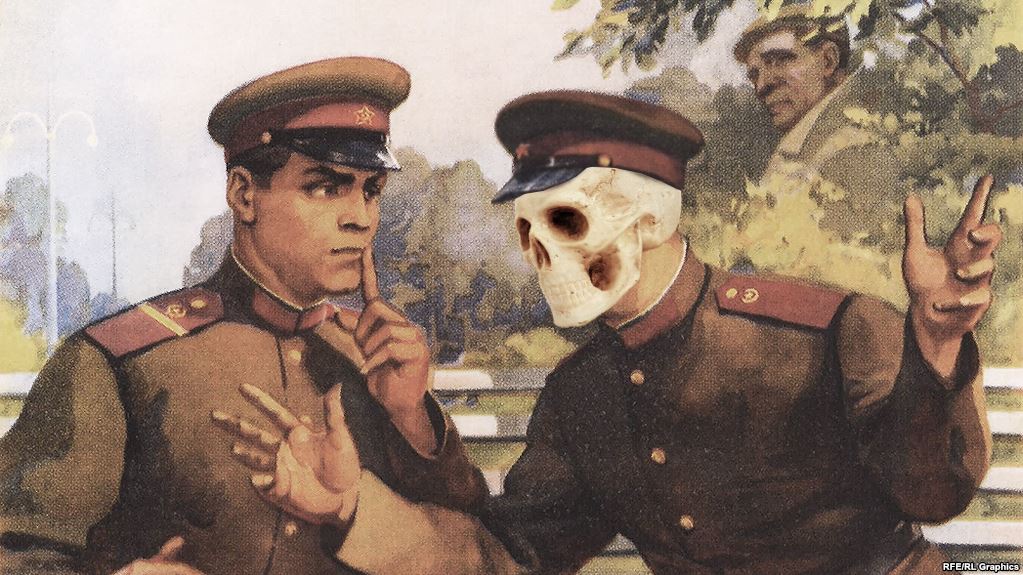Fear of dying of starvation has led many Ukrainians to believe that when it comes to choosing between “bread or freedom” it is best to choose “bread”.
Countless Ukrainians died of hunger in June of 1933 – every minute, more than twenty persons; every hour, more than fourteen hundred people and every day, thirty-four and a half thousand. These data, presented by the Institute of National Remembrance of Ukraine mark only the tip of the iceberg of the Ukrainian tragedy called Holodomor. Not only did the Holodomor claim millions of lives, but earlier it destroyed the nation’s elite, the country’s best representatives in all spheres of life. When the physical annihilation was over, the Holodomor syndrome was “programmed” to make millions of survivors fear death by starvation, and taught people to hide any manifestation of Ukrainian identity. Thousands of Ukrainians bear the cross of the Great Famine, remembering the tragedy of their respective families in the context of an overall Ukrainian tragedy.
80 percent of Ukrainians believe that Holodomor 1932-33 was genocide perpetrated against the Ukrainian nation.
Such data are cited by Rating Group sociologists, who conducted the survey in October 2015. They stress that the number of people who agree that the Holodomor is genocide has soared over the past two years. The number of people who disagreed last year fell from 25 to 12 percent.
Volodymyr Vyatrovych, Director of the Institute of National Remembrance”
“We will never know how many Ukrainians actually died of starvation because the Soviets destroyed or hid information by classifying it as “top secret”. The Communist totalitarian regime did everything in its power to cover up the crime. It will take us a very long time to establishing accurate numbers, but we’ll never know the exact number. Historians and demographers are pouring through archives. In fact, experts at the M.V. Ptukh Institute of Demography of Ukraine state that about four and a half million people died of hunger.”
The families of Holodomor victims – those who survived – feared hunger for the rest of their lives, and this fear was passed on to future generations. Psychologists maintain that the fear of dying of starvation led Ukrainians to believe that it was better to choose “bread” when confronted with the dilemma – “bread or freedom”. After the Holodomor, the old saying – “it’s none of my business” , and nationwide indifference to some faraway fights for human rights is reflected in another Ukrainian attitude – “but it’s peaceful here, and I have enough to eat, so leave me alone!”
Volodymyr Pohorily, Expert at the Psychological Crisis Service notes that people who have been hungry continue to fear famine and so, they stock food, check whether there is sufficient food at home and constantly try to feed their family.
“Remember how elderly ladies reacted in the 1990s, and even now to the economic crisis – they bought and continue buying bread, candles and salt – an experience endured for generations! My father was born in the year of the Holodomor, and lived through the 1947 famine. Dad still can’t eat black bread because he associates it with “bread” that was made with tree bark and herbs. My mother, whose family survived the Holodomor always scolded me if I didn’t show respect towards a slice of bread and she hoarded money just for bread or flour.”
Pohorily confirms that Dutch scholars have found that hunger changes people’s genotype (over 18,000 people died of starvation in the Netherlands in 1944). The Soviet regime’s programme of “death by hunger” and “torture by hunger” broke the Ukrainian nation psychologically. People who committed crimes against their own countrymen by taking bread from peasants also suffered mentally as did those who remained without bread or food and were powerless to oppose them.
“When people feel powerless, when they realize that that their closest and dearest friends and relatives are dying before their very eyes and they can do nothing to help, it breaks their spirit, something cracks…. There is a sense of guilt, despair and anxiety; people lose control over their own lives and actually lose their own personality (individuality).” affirms the psychologist.
Roksana Kharchuk, scholar, writes about the Holodomor syndrome on Facebook:
“Ukraine produces three times more food than it needs, but we’re still afraid of starving. Every winter, people store food so as not to worry! That’s some kind of Holodomor syndrome. I feel so sorry for our people… so very sorry. I’m sorry because if we don’t move forward in the near future, albeit minimally, nothing good awaits us.”
Spreading the truth about the Holodomor – the key to overcoming the “fear of hunger”
Academics and scientists have no concrete proposals on how to overcome the fear of hunger, but they maintain that much depends on further research and education. Scientists are working with pedagogues on modern methods of teaching such a complex subject as the Holodomor. Academics at the National Museum Memorial to Holodomor Victims conduct interactive remembrance lessons for schoolchildren
Currently, it is difficult to explain the Holodomor to 7-9-year-old children who should feel empathy towards Holodomor survivors.
Olesia Stasyuk, Director of the Museum:
“In our interactive classes, students are taught how to evaluate friendship and assistance in difficult situations, as well as learn basic concepts related to the Communist regime. Kids need to learn we should all remember the Holodomor and tell the next generation that this must never happen again.”
Ukrainian historians consider that it is necessary to widely publicize research sources and results, and use this data to organize an international tribunal on Communism in order to investigate Soviet crimes. Russia, they assert, which considers itself the successor of the USSR, is currently follows a policy of “state terror” and military aggression and feels it can act with complete impunity.
However, Kremlin propaganda continues to deny the Holodomor as genocide of the Ukrainian nation and distorts information about the famine, which contributes to spreading old fears and anxieties in Ukrainian society.
Some 70 years ago, the Nuremberg Trials sentenced top Nazi war criminals. The world was then vaccinated against Nationalsozialismus and fascism. However, the world has failed to bring Communist atrocities to justice. The Holodomor stands as a horrifying Communist crime against Ukraine and its consciousness.







